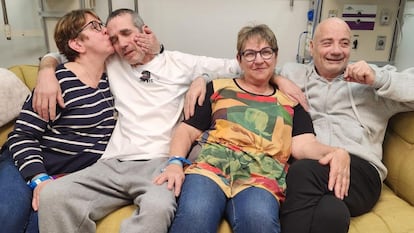Israel rescues two hostages in Gaza, killing at least 67 Palestinians in the operation
The raid was celebrated in Israel as a victory in the sluggish battle to free the hostages, with more than 100 captives still held by Hamas and other Gaza militants

For the first time in the war in Gaza, the Israeli army freed two hostages in a rescue operation: Fernando Simon Marman, 60, and Norberto Luis Har, 70, both civilians and Argentine-Israeli dual nationals. The operation — which had been planned some time ago, but put on hold until the right moment — used intense aerial and artillery bombardments as a diversion. According to the Gazan Health Ministry, at least 67 people died in just a few hours.
Hamas accused Israel of committing “massacres against unarmed civilians.” Israel Defense Forces (IDF) spokesperson Daniel Hagari recognized that “intense firepower” was used in the raid. “Reaching the target in the heart of Rafah was very complex,” Hagari said. Israel is planing a ground invasion of Rafah, and more than a million Palestinians are set to be displaced.
The success of the rescue mission is a rare feat that comes amid growing doubts about Israel’s war strategy. In the 129 days since the start of the war, IDF special forces have only managed to free one soldier. The army acknowledged that some rescue attempts have ended in failure and civilian deaths, and that at least four hostages were mistakenly killed, even though three of them were waving white flags with messages in Hebrew.
The operation also gives Israeli Prime Minister Benjamin Netanyahu some breathing room as his approach to freeing the hostages comes under greater scrutiny. The families of the captives accuse the prime minister of sacrificing the hostages in order to achieve a “victory photo.” An internal Israeli army investigation concluded last week that a hostage was most likely killed in an aerial bombardment.
A new hostage-prisoner exchange has been under negotiation for weeks, but the talks have not led to any agreement. Meanwhile, Netanyahu continues to insist on the importance of Israel’s offensive in Gaza, arguing it is key to freeing the captives. He repeated this message on Monday following the release of the two civilians. “Ferdinand and Louis, welcome home. I salute our brave fighters for the daring action that led to their release. Only continued military pressure, until total victory, can bring the release of all our hostages,” he said in a statement. Another 134 Israeli hostages remain in Gaza, at least 31 of whom have died.
The two freed hostages are in good health, the hospital confirmed after an initial check-up. Marman and Har are brothers-in-law who were captured in the October 7 attacks in a kibbutz near Gaza, along with three family members: Clara Marman, Har’s wife; his sister Gabriela Leimberg and the latter’s teenage daughter, Mia Leimberg. The three — who are also Argentine nationals — were returned home at the end of November during the hostage-prisoner exchange, which saw 105 hostages released in exchange for 240 Palestinian prisoners during a week-long ceasefire.
The office of the Argentine Presidency welcomed the news of the hostages’ release in a statement, adding it hopes that the remaining 10 Argentine hostages will also be freed. Argentine President Javier Milei recently visited Israel, where he showed his unwavering support for the country, reaffirmed his promise to move Argentina’s Embassy to Jerusalem, and described Hamas as “modern Nazism.”
Sign up for our weekly newsletter to get more English-language news coverage from EL PAÍS USA Edition
Tu suscripción se está usando en otro dispositivo
¿Quieres añadir otro usuario a tu suscripción?
Si continúas leyendo en este dispositivo, no se podrá leer en el otro.
FlechaTu suscripción se está usando en otro dispositivo y solo puedes acceder a EL PAÍS desde un dispositivo a la vez.
Si quieres compartir tu cuenta, cambia tu suscripción a la modalidad Premium, así podrás añadir otro usuario. Cada uno accederá con su propia cuenta de email, lo que os permitirá personalizar vuestra experiencia en EL PAÍS.
¿Tienes una suscripción de empresa? Accede aquí para contratar más cuentas.
En el caso de no saber quién está usando tu cuenta, te recomendamos cambiar tu contraseña aquí.
Si decides continuar compartiendo tu cuenta, este mensaje se mostrará en tu dispositivo y en el de la otra persona que está usando tu cuenta de forma indefinida, afectando a tu experiencia de lectura. Puedes consultar aquí los términos y condiciones de la suscripción digital.









































